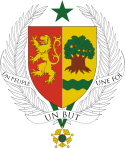- Constitution of Senegal
-
Senegal 
This article is part of the series:
Politics and government of
Senegal- Constitution
- President
- Prime Minister
- Souleymane Ndéné Ndiaye
- Souleymane Ndéné Ndiaye
- Parliament
- Political parties
- Elections:
- Regions
- Departments
- Arrondissements
- Communes
- Rural communities
- Casamance conflict
- Foreign relations
The fourth Constitution of Senegal (Constitution de la République du Sénégal) was adopted in a 2001 referendum. The country has had three other constitutions before: in 1959, 1960 and in 1963.[1]
References
- ^ Histoire de la Constitution (in French)
External links
Constitution of Africa Sovereign
states- Algeria
- Angola
- Benin
- Botswana
- Burkina Faso
- Burundi
- Cameroon
- Cape Verde
- Central African Republic
- Chad
- Comoros
- Democratic Republic of the Congo
- Republic of the Congo
- Côte d'Ivoire (Ivory Coast)
- Djibouti
- Egypt
- Equatorial Guinea
- Eritrea
- Ethiopia
- Gabon
- The Gambia
- Ghana
- Guinea
- Guinea-Bissau
- Kenya
- Lesotho
- Liberia
- Libya
- Madagascar
- Malawi
- Mali
- Mauritania
- Mauritius
- Morocco
- Mozambique
- Namibia
- Niger
- Nigeria
- Rwanda
- São Tomé and Príncipe
- Senegal
- Seychelles
- Sierra Leone
- Somalia
- South Africa
- South Sudan
- Sudan
- Swaziland
- Tanzania
- Togo
- Tunisia
- Uganda
- Zambia
- Zimbabwe
States with limited
recognitionDependencies and
other territories- Canary Islands / Ceuta / Melilla / Plazas de soberanía (Spain)
- Madeira (Portugal)
- Mayotte / Réunion (France)
- Saint Helena / Ascension Island / Tristan da Cunha (United Kingdom)
- Western Sahara
Categories:- Politics of Senegal
- Constitutions by country
- Senegal stubs
- Law stubs
Wikimedia Foundation. 2010.
